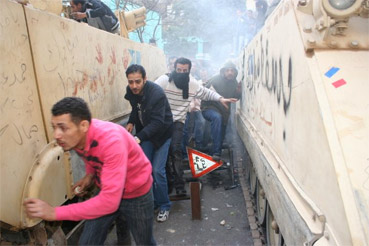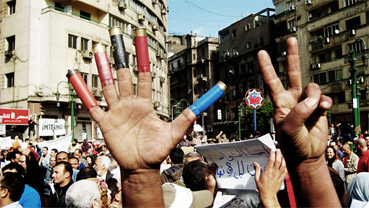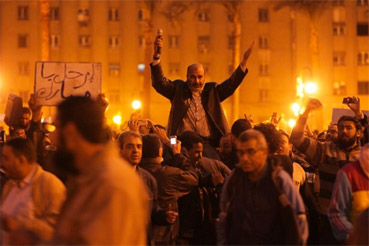|
The 55th BFI London Film Festival was packed full of powerful, often explosive documentaries. Now that the dust has settled and the films have mulched down, disentangled, in the mind, I'd like to pick out three non-fiction films that stood out. One of the functions of documentary is to allow us to look our times square in the face. Tahrir 2011: The Good, The Bad and The Politician does so with an immediacy few films this year can match. Another function of documentary is to record history, so that we might remember not forget. Both Bernadette: Notes on a Political Journey and The Black Power Mixtape 1967-1975 reclaim pivotal moments in recent history from organised forgetting. Tahrir 2011, a trilogy about the recent revolution in Egypt, was an exciting late addition to the LFF programme, while the other two films were both shortlisted for The Grierson Award for Best Documentary. All five films have much to say to one another and to us. I will begin with the three concerned with recent events in Egypt and work backwards.
In Tahrir 2011, Tamar Ezzat considers The Good, those courageous citizens who effectively buried the old Arab order in Cairo's Tahrir Square; Ayten Amin focuses on The Bad, officers of the state security apparatus who stood between tyranny and popular anger; and Amr Salama's The Politician focuses on that embodiment of vanity and political insanity, despot Hosni Mubarak himself. These filmmakers embarked on a race against time to produce a remarkably swift cinematic response to the Day of Rage of 25 January, and the 18 days of street-fighting that lead to Mubarak's enforced resignation on 11 February. Anyone familiar with the processes of commissioning, pre-production, shooting and post-production will find it incredible that the film was completed in time for its world premiere at the Venice Film Festival in early September.
If the speed with which the film was created is staggering, it is as nothing to the speed with which the Egyptian people toppled the dictator regarded as 'our man in Cairo' by the White House and described as "a force for the good" by Tony Blair. Within a matter of weeks, those in Tahrir Square had exposed the complacent entente cordial that existed between Arab authoritarianism and complicit Western governments, shattered the myth of Egyptian political apathy, issued a warning to the regions' many tyrants, and sent a signal to the Palestinian people that they were no longer alone – a message received loud and clear in Gaza, Jerusalem and Tel Aviv. It is worth noting here that Mubarak's deep unpopularity resulted as much from his craven attitude to Israel and the US as to his servile surrender to Western banks and corporations. Under Mubarak, Egyptian intelligence worked closely with Mossad, while CIA agents have said that Egypt was the best place to send 'parcels' if you wanted them to 'disappear'. Of course, many ordinary Egyptians also 'disappeared' during Mubarak's rule. Many more died 'of natural causes', which is to say, in the poverty of Cairo's shantytown slums, home to one in four of the city's 19 million inhabitants.

Tamar Ezzat's film, The Good, records the Egyptian people in their finest hour, as they united as 'one hand', and stood, startled but elated, on the threshold of their 'moment of change'. Ezzat transports us to Tahrir Square and the tumultuous events that occurred in the centre of the Arab world's largest city, often called the 'mother of the world'. He was there, establishing facts on the ground, as Egyptians fought for democracy, having discovered the collective strength to break through the wall of fear that had dominated their lives and challenge the military regime that had ruled their country with increasingly barbarous violence for 30 years.
The film focuses on several participants, including an articulate member of the Muslim Brotherhood whose life was saved by a homemade bullet-proof vest, an equally articulate unveiled woman who tells us she had to be there, a student photojournalist who returned home from Denmark to let his images do the talking, and a heroic young man we see clambering aboard a moving tank. The film also records, with impressively steady camerawork, the enormous crowds that gathered to defend the square. The force of the film's footage is underpinned by our horrified awareness that many of those we see in the film will now be among the thousands currently incarcerated in Egyptian jails, placed there by arbitrary and vengeful military tribunals.
At the start of the film, we stand with a small, beleaguered group of activists. We follow their gaze, beyond police lines, to a vast wave of people marching towards them to reinforce their cause. That single scene tells the story of those times. It reminds us of the turning point when Egyptians ceased to stand by as spectators and stepped forward en masse to shape history. As we watch, self-consciously, as spectators in the cinema, the film recruits us as partisan supporters of the revolution. We enter the hastily constructed field hospitals that cared for those battered by the baltagiya – Mubarak's paid thugs. We stand with the cameraman as those same mercenaries, mounted on camels and horses, charge the crowd. We smile inside at the 'barber of the revolution' as he cuts hair, gratis, on the square and we laugh aloud as thousands of shoes are raised aloft as an insult to Egypt's ruling class. Finally, we are in the streets with the euphoric crowds as they celebrate Mubarak's downfall. The film takes us to the heart of the revolution, as it happened, and presents riveting on-the-spot testimony. It offers us an opportunity to witness for ourselves the determination, defiance and passion we barely glimpse in anodyne TV news reports.
Ayten Amin's The Bad is a less exciting but, in some ways, more intriguing film. It was made, with perfect timing, just after Mubarak was dispatched, when the army and police were nervous, vulnerable and insecure. Amin shot her film when pro-democracy forces still held the initiative, just before the shutters of silence came down again. Even during the period before the counter-revolution, when the military council that replaced Mubarak was still uncertain of its control, Amin had difficulty getting the defeated, defensive officers of state security to talk. As she tries to interview policemen, one says it all when he snaps, "I'm not allowed to speak while on duty." A shifty intelligence agent had agreed to be interviewed but refused, at the last minute, to appear unless his face was distorted. He details, in matter-of-fact terms, the process by which names mentioned in interrogation were painstakingly noted. He then chillingly reveals that a 'file' would automatically be opened on anyone and everyone mentioned on three occasions. He also describes his reluctance to comply with orders to shoot dissidents on sight during covert operations, then, smilingly, reveals his feelings of slight discomfort at having done so.

A shaded-out senior police officer reveals equally elusive traces of conscience while recalling the moment he and his colleagues realised they were beaten (no pun intended), overwhelmed by the numbers on the streets. He inadvertently generated gales of laughter in the cinema when he wryly observed that men in uniform are never popular. Needless to say, those Amin interviewed display a wide range of self-justifying, obfuscatory thinking. One, for example, says of the revolution, "Why didn't we do that before? What were we thinking?" Despite such inevitable after-the-event spin, the film still provides a rare insight into the mindset of men acting under orders. It is through their many pauses, silences and spluttered evasions, that the real picture emerges. It is regrettable that Amin lacked the time to interview any of the two million informants deployed by Egypt's monolithic Ministry of the Interior or any of the country's thousands of victims of torture, but she, nevertheless, presents a revealing snapshot of the men who have internalized the dominant ideology, the kind of men who, once again, hold the whip hand in Egypt.
In the third and final film in the trilogy, Amr Salama's The Politician, Mubarak is placed centre stage. The film's assessment of him comes in the form of satirical advice on, How to Become a Dictator in 10 Steps. Salama tosses off amusing 'advice' at quick-fire pace, highlighting, for example, Mubarak's liberal use of hair dye, a habit enthusiastically adopted by his governing colleagues. Fortunately, that flippant observation flows into more trenchant criticisms of power, namely the way the ubiquity of Mubarak's image helped cement the idea that he and the nation were indivisible. Of course, Mubarak was one among many when he deployed the refined tricks and techniques of modern propaganda to his own ends; few politicians avoid publicity, fewer still are camera shy. Many people and peoples will watch The Politician with their own homegrown Mubaraks in mind. When I asked Salama how his film had been received at the Venice Film Festival, he told me that many of the Italians he had spoken to had instantly recognised aspects of Silvio Berlusconi in the film.
Gratefully received and important though this trilogy is, it unfortunately offers little in the way of either historical context or political analysis and we learn next to nothing about the forces that combined against the regime. In the case of both The Good and The Bad, superb spontaneous and instantaneous footage is offered in compensation for that lack of depth, and we can, anyway, readily excuse that failing on the grounds that the films were made in haste. The lack of context and analysis is, however, more disappointing in The Politician, which largely plays for laughs and is typical of the way entertainment values have seeped into non-fiction filmmaking. Debates about the extent to which that process damages cinema and society are a luxury for directors in the Arab world, but few of them would contest the notion that a healthy, self-confident, distinctive documentary culture leads to a more effective cross-examination of power and a better-informed citizenry. And of course, the debate doesn't end, either in Egypt or elsewhere, with the problems facing filmmakers intent on attracting audiences and budgets for documentaries, because, while the entertainment values of narrative cinema have seeped into non-fiction film, documentary techniques have rushed in the opposite direction.

As Amr Salama began work on The Politician, he was also completing Asmaa, a fiction feature in which he uses the 'wobblyscope' style of fly-on-the-wall documentary within a conventional, occasionally syrupy narrative format. I saw these films on the same day as The Tahrir 2011 trilogy, at the London Film Festival, so the processes mentioned above struck me with particular force. Asmaa tells the 'true story' of a remarkable working class woman who acted against injustice even before the waves of civil disobedience had begun to roll out from Tunisia to Tahrir Square and beyond. Asmaa (Hend Sabry), a 45-year-old Cairene, is HIV-positive. She is denied treatment for a gallbladder complaint by doctors in thrall to prejudice, and suffering from ignorance about AIDS. Tunisian-born Hend Sabry, one of the Arab world's most talented actresses, plays Asmaa with powerful conviction, and even hardened cynics will be moved by the story of the woman who bravely revealed her face and situation during a live TV broadcast. In that one exemplary, unprecedented act of defiance she faced down a number of taboos deeply embedded in Egyptian society and, perhaps, emboldened others to embark on copycat acts of courage.
Salama conceived the idea for Asmaa while making a documentary on HIV/AIDS several years ago, after his initial irritation at his subjects' refusal to reveal their identities was replaced by realization that "the real virus is in the minds of the people watching and judging." When I suggested that Asmaa's story might have made a powerful documentary, Salama said, "Well, yes, but there's no real audience for documentary in Egypt. I wanted to make a film that reached more people." The question of reach continues to dominate debate about documentary's capacity to disseminate information and ideas effectively. It also determined Mohamed Diab's decision to make 678 as a fiction film. A succès de scandale that blew the lid off the widespread problem of sexual harassment, Diab's film is, like Asmaa, part of a wave of recent Egyptian films to take on social issues. I'm not qualified to say whether the insurrectionary mood of Egyptians prompted those films, but I can say that they all deploy the tried and tested techniques of narrative cinema. Those tendencies make the Tahrir 2011 documentary trilogy all the more remarkable and bold an intervention.
We must hope that the Egyptian revolution isn't over yet. If it is, Egyptians may face a depressing drift back to the atrocious political circumstances that applied under Mubarak. As Mao famously said when asked if the French revolution had been a success, "It's too early to say." If the Supreme Council of the Armed Forces does return to its authoritarian ways, and there are signs that it is beginning to do so, freedom of expression in Egypt may, once again, become subject to the whims of the military regime, at which point debates about documentary film culture will become even more academic than they already are. Samara is cautious about the future: "You can criticise Mubarak as much as you like now but nobody's sure what else we'll be allowed to say. I'm nervous about the reception of our films back home. We hope they have an impact." He is also concerned that many of the bureaucrats who voiced mild criticism of Mubarak when he interviewed them for The Politician might make political capital from that during the forthcoming elections.
Alaa Al Aswany, one of Egypt's most important writers and a leading figure in the opposition movement, Kefaya (Enough!), distinguished between freedom of speech as a seditious weapon in the struggle, and its function as "a decoration of the regime." He coined the phrase, "They let the dogs bark," to describe the circumscribed nature of cultural politics in Egypt. When I mentioned Al Aswany's phrase to Amr Salama, he nodded approval, then said, "They let you bark all right. It's when you bite them that the trouble starts." Tahrir 2011: The Good, The Bad and The Politician makes an important contribution to our appreciation of the Egyptian revolution. It remains to be seen how far it will go in encouraging Egyptians to bare their teeth and bite again, be that through the ballot box or back on the streets and in Tahrir Square.
|